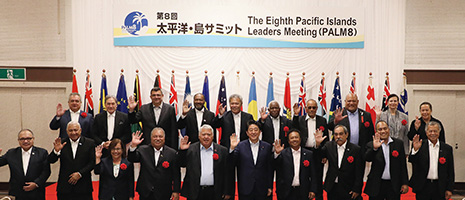Home > Highlighting JAPAN > Highlighting Japan June 2018 > Prime Minister's Diary
Highlighting JAPAN


- PREVIOUS
- NEXT
Address by Prime Minister Shinzo Abe at the Eighth Pacific Islands Leaders Meeting (PALM 8)
On May 19, 2018, Prime Minister Shinzo Abe attended the 8th Pacific Islands Leaders Meeting (PALM8), which was held in Iwaki City, Fukushima Prefecture.
Prime Minister Abe attended the summit meeting and gave an address at the beginning of the opening session.
“We all know that climate change is among the most urgent concerns for Pacific island nations. Japan's cooperation on this matter through Taranoa Dialogue, for instance, will continue, I assure you.
Resolute in our determination that safeguarding the sea and safeguarding the planet and humankind are one and the same, my country will continue to make efforts with you all.
Where Japan wishes to place emphasis from now is, first of all, in establishing the rule of law in the maritime order.
Since ancient times, it is the Pacific Ocean that has given us blessings of the sea. And it is the rule of law that gives protection to the nations, big and small, for their inherent rights.
Japan will be unstinting in its assistance towards improving countries’ capacity to “protect the sea,” including each country’s legal enforcement capabilities.
I would like to ask all the leaders here to give special consideration to Japan’s fishing activities. At the same time, regarding assistance to enhance your guarding capabilities and your capacity to conserve resources, I believe Japan has a role it can play with confidence and pride.
Second, Japan will work to develop quality infrastructure in both “hard” and “soft” aspects so that you are able to realize sustainable prosperity in a self-reliant manner.
And third, we will enhance people-to-people exchanges further and work together with you all to cultivate leaders who will shoulder the future of the PALM nations. Over the next three years, until we gather for the next PALM, Japan intends to work to foster human resources and exchanges for more than 5000 people.
My friends, it is nothing more than an artificial, expedient custom to distinguish between one stretch of water we call the Pacific Ocean and another we deem the Indian Ocean. The two are one and the same, as a matter of course.
It was the ancestors of the PALM peoples that in the long-distant past brought about the “confluence of the two seas” through trade.
There is a theory that a word in Tanzania, “huti,” was originated from the Polynesian word “punti,” both of which mean “banana.”
Bananas found their way from the Pacific islands to the eastern coast of Africa. It was the ancestors of the PALM peoples, the greatest ocean navigators the world has ever known, that brought them there.
The “Blue Pacific” where we make our home is one and the same as the “Blue Indian Ocean.” Opportunities and possibilities coexist in these two seas, and the questions to be worked out and the growing crises stretch across both oceans, unable to be separated.
On this occasion, shall we not -- each and every one of us -- take on an expansive oceanic identity by which we view the two oceans holistically?
That will expand our field of vision geographically. It will impart to us a viewpoint by which we look at the system of the vast seas with a very long term perspective.
It has been 21 years since the PALM process began.
We have arrived here just as if we were in a long-distance relay race, passing the baton along as we run.
The PALM process is an unbroken stream that flows thanks to the efforts of countless people in both Japan and Pacific island nations, including those at the grassroots level as well as those in business and academia. I wish to end my remarks to you by expressing my heartfelt thanks for the tireless efforts of those who have come before us.”
- PREVIOUS
- NEXT
© 2009 Cabinet Office, Government of Japan






